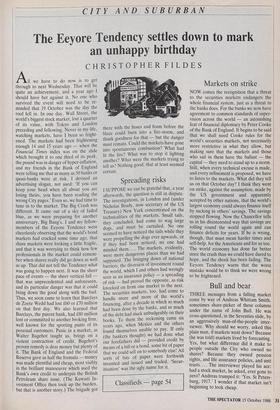Spreading risks
I SUPPOSE we can be grateful that, a year afterwards, the question is still in dispute. The investigations, in London and (under Nicholas Brady, now secretary of the US Treasury) New York concentrated on the technicalities of the markets. Small tails, they concluded, had come to wag large dogs, and must be curtailed. No one seemed to have noticed the tails while they were propelling the dogs ever upwards, or if they had been noticed, no one had minded them.... The markets, evidently, were more dangerous places than we had supposed. The bringing down of national barriers, the diversion of investment round the world, which I and others had wrongly seen as an insurance policy — a spreading of risk — had proved the opposite, as risk knocked on from one market to the next. The securities markets, too, had come to handle more and more of the world's financing, after a decade in which so much had been done by the banks, and so much of the debt had stuck unbudgeably on their books. To them the reckoning came six years ago, when Mexico and the others found themselves unable to pay. If only (the bankers thought) we had done what our forefathers did — provided credit by means of a bill or a bond, some bit of paper that we could sell on to somebody else! All sorts of bits of paper were forthwith invented and issued and traded. `Secur- itisation' was the ugly name for it.


























































 Previous page
Previous page